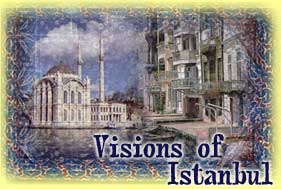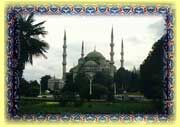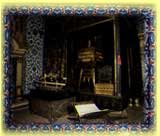 |
 |
 |
|
|||

Visions of Istanbul When you eavesdrop on the sounds of a city, you get a fleeting glimpse of its personality, as if, by some feat of magic, you could witness the small random habits and idiosynchracies of a stranger; and in so doing, discover some essential secret about them. 
Now, Istanbul keeps its secrets well hidden, but every so often the veil drops, briefly. There's a courtyard, just off a street which winds down a long hill from Taksim Square towards the waterfront. And everyday at noontime a boy around fifteen years old plays his accordion there. The office workers in the adjacent buildings pause by their open windows, and every so often, someone tosses a few coins out of the window for him. Follow that same street to the bottom of the hill past the club where men play cards and backgammon passing by delivery vans broadcasting their signature sound sound and you'll reach the Bosphorus, which separates Europe from Asia. Divided by this ancient waterway Istanbul straddles both continents On a warm day on the waterfront a ragtag posse of boys enact their own summertime rituals leaping into the water off the jetty rocks sound while freighters and ferries traverse the Bosphorus from the Black Sea to the Sea of Marmara adding their own voices to the (eclectic) chorus of Istanbul There are from ten to fourteen million human voices in that choir Istanbul, the size of Rhode Island, is bursting at the seams There's plenty of traffic and congestion, with buses and taxis the vehicles of choice But stroll around the city and you'll likely find a respite and hear its other voices. A man with a wheelbarrow full of old lamps and assorted metal objects He's a junk man, a recycler, a baritone. 
In the heart of Istanbul, there is a spice bazaar a grand bazaar, a book bazaar and the streets surrounding these great warehouse sized passageways are home to sellers of produce, hardware, clothing, toys, carpets, crafts and goods of every description. Amongst the shopkeepers, a small army of tea boys carries trays filled with glasses of Turkey's national beverage delivering the tea to shopkeepers, taking a few plastic tokens in payment. Their bosses make the rounds once a week exchanging tokens for Turkish lira. If you're on a rooftop looking out on the vista of Istanbul you'll see mostly urban sprawl. It could be any ungainly worldly metropolis except for the fact that interspersed amongst the concrete condos are these other-worldly monuments. Enormous half melon domes atop sand castle pyramids bounded by giant candlestick spires and at the night the whole mosque is lit up like a fairytale palace a luminous gesture embracing the ground, yearning for the skies. Circling the minarets drawn like moths to their incandescent beauty seagulls soaring in and out of the light as if the marriage of the dome belly and the uplifted towers brought forth these night flying ethereal satellites And there are moments from dawn through the day till twilight when the minarets remind the city of Istanbul why they are there. 
Istanbul balances the legacies of east and west with its own proud memories as the capital of both the Byzantine and Ottoman Empires. And it is home to a cornucopia of ethnic types of Turks, Greeks, Kurds, Armenians, Jews with each group lending a flavor of its own to the cultural mix. You can hear that blend reflected in the music at the meyhanes, the supper clubs throughout the city where tonight, let's say in Kumkape on a street that's lined with outdoor cafes gypsies will come to your table and one will have a violin, the others an oud, a drum, a clarinet, and a kanun--which looks like a cross between a dulcimer and a zither. They all taught themselves how to play and they'll play like virtuosos. If you want a belly dancer, it costs extra. With a little taste of raki it's not hard to imagine that this music is an anthem for the city of Istanbul for the Russian women who are walking up and down this gypsy street holding a vase in one hand and a sword in the other; for the groups of old men dressed in caps and vests who congregate every noon at a wall in a courtyard near a mosque conversing turning their worry beads like a rosary in their hands; for the shoeshine men who wait in their bronze thrones in the lobbies of hotels; for the lovers who stroll through the streets of Urtakoi at night; for the Orwellian presence of Mustapha Kemal Ataturk the founder of the Turkish Republic whose face looms over this city on billboards, buildings and statues; for the stately old summer houses, the yallas, that line the shores of the Bosphorus; for the sellers of raisins and pistachios and henna and the women who buy it dressed in the height of western fashion or covered with a long robe, scarf and veil; for the stalwart members of the Mehter military marching band each sporting an identical moustache; for the lounging smokers of hubble-bubble pipes; for the eight year old boys, just circumcised, who parade in their spangled costume with sash and epaulets waiting for a barrage of proud relatives and presents; for the ghosts of harem concubines and the sultans they served -- even those who went mad, living out their lives in a veritable cage surrounded by beautiful women; for the dervishes who still whirl and who say that this city and the sky above it and the universe that we are particles of are all spinning. 
And at this moment beneath the heart of Istanbul in the cistern of the basilica where lines of ancient columns stand in pools of water this sound still reverberates, even now. And at the Topkaki Palace in the room where the sacred hairs and relics of the Prophet are kept someone is reading the Koran, even now. And somewhere in Istanbul someone is singing and if they're not alone, everyone else is likely to be joining in even now.
|
 | American Public Media Home | Search | How to Listen ©2004 American Public Media | Terms of Use | Privacy Policy |